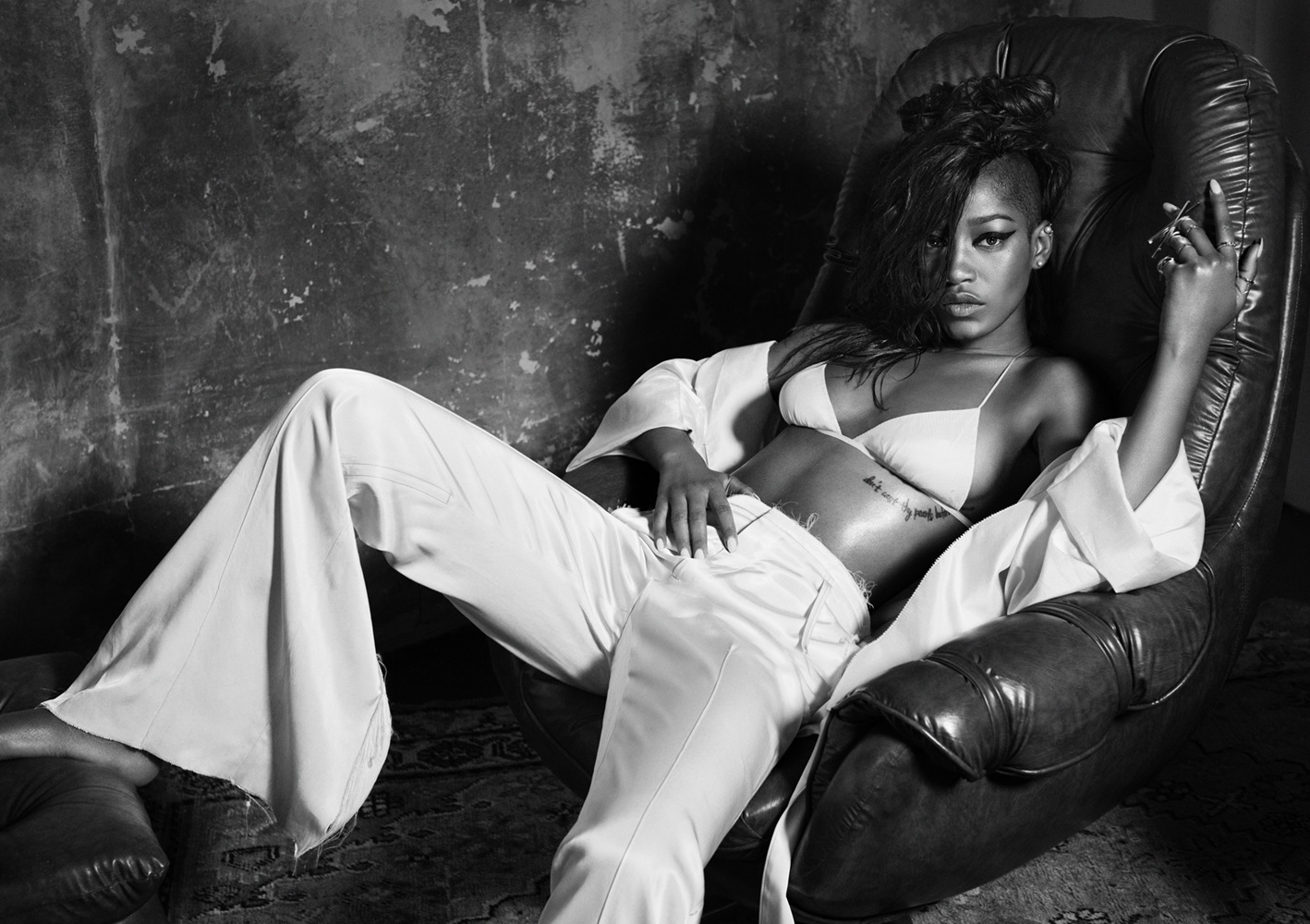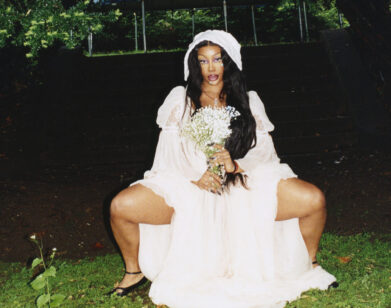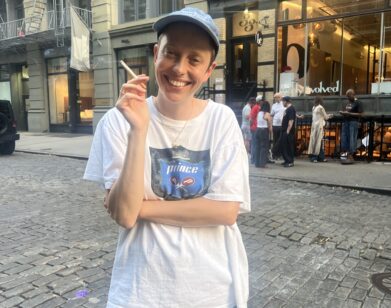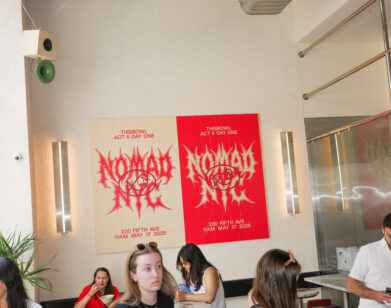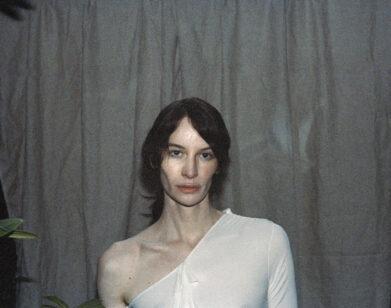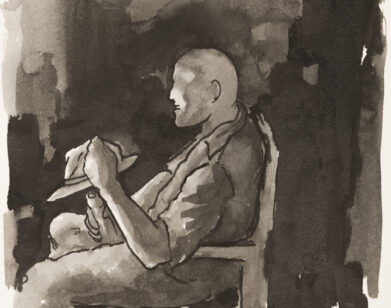Keke Palmer
KEKE PALMER IN NEW YORK, MARCH 2016. PHOTOS: MICHAEL SCHWARTZ. STYLING: KRISANA SOTELO/THE WALL GROUP. HAIR: LACY REDWAY/THE WALL GROUP USING L’OREAL PARIS USA. MAKEUP: ERIN PARSONS/ STREETERS USING MAYBELLINE NEW YORK. SET DESIGN: KAITLYN DU ROSS WALKER/HONEY ARTISTS. PHOTO ASSISTANTS: NATHAN MARTIN AND AMANDA YANEZ. DIGITAL TECH: KATIE HAWTHORNE. STYLING ASSISTANT: JACLYN MCKENZIE.
Lauren “Keke” Palmer is an industrious individual. The Chicago-native landed her first film role as Queen Latifah’s niece in Barbershop 2 at the age of nine. Four years later, she released and toured her first album. By 15, she was already carrying her own Nickelodeon show, True Jackson.
Now 22, Palmer has yet to slow down: recent projects include the independent film Brotherly Love, Ryan Murphy’s wildly funny dark comedy series Scream Queens, Grease Live, and a new album, which she hopes to release this autumn. She’s written the treatments for her two most recent music videos, “Enemiez” and “I Don’t Belong to You,” and is working on a non-fiction book also titled I Don’t Belong to You (her first). If that wasn’t enough, she’s producing a film called Pimp in which she will play the titular hustler. “Sometimes my schedule will get crazy and other times it will be chill. That’s just the way the industry is,” she says over the phone. “I’m usually the one who creates most of my work. I have a lot of different ideas that I want to do, so I’m always like, ‘Get on it girl.'”
In spite of her many commitments, however, Palmer manages to remain more person than product. When you meet her in the flesh she is warm and friendly to everyone in the room. She has an avid Snapchat following because she believes it’s a more accessible platform than Instagram. She is happy when Scream Queens fans come up to her in the street and quote her character Zayday Williams’ line, “Bitch, I’m about to smack you so hard your tampon’s gonna pop out.”
“I think it’s adorable,” she says laughing. “It just goes to show that Ryan Murphy, Brad Falchuk, and Ian Brennan really get the generation. They have these characters that pop off of the page so much,” she continues. “All the characters have their own thing: you have three mean girls, but they all have different qualities. You have the goody two-shoes, but different types.”
Palmer’s positivity is also striking. “I think I was always joyous,” she explains. “But I don’t think I became very aware of positivity and its power until I became older. I always did it naturally, but then I lost it and it forced me to find it again and appreciate it more.”
EMMA BROWN: You wrote the treatment for your music video “Enemiez.” Is that something you’ve been interested in doing for a long time?
KEKE PALMER: I never realized that it was something I was into until I kept having visions for certain scenes. When songs would come up, I would have a vision. I thought, “If I have this way of thinking about it I should write a treatment.” I would love to direct videos and that’s what it keeps moving towards, but I have to stop being scared in order to do that.
BROWN: When did you have the vision for the “Enemiez” video?
PALMER: It didn’t come to me until later. When I first heard the song, I was more listening to the lyrics and allowing them to resonate with me on a different scale. The video portrays you coming into your own self and allowing yourself to fight for what you believe, as opposed to the song, which is really saying, “I’m going mad because of the way that I feel for you and the fact that you don’t feel that way back.” It’s expressing another vulnerability than is being displayed in the video. When we were doing the video, I wanted to showcase more the vulnerability that I’m experiencing at the artist.
BROWN: When you’re considering a song, is there anyone you play it for to get a second opinion?
PALMER: I do play it to certain people. It’s not really about getting their opinion; it’s more about seeing how they react to it. If there’s a certain song that I want to reach a certain person or certain type of person, that’s when I play it for people. Like my little sister and brother, I always play them my music because I want people like them to be able to relate to my music. They always know what’s going on; they’re up on what’s new. For me, when they hear my music and they like it, I’m on the right track.
BROWN: Are they pretty honest?
PALMER: Yes. Brutally.
BROWN: You were so young when you got your first record contract. Do you ever look back on the stuff you released when you were younger? Does it still feel like you?
PALMER: Oh yeah. All the time. It does feel like me at a certain point. I still needed to grow into my voice. I can hear certain points where I’m allowing myself to be free and then I also have another side where I notice that I was kind of holding back, so it’s a little half and half. But I think it’s less about me holding back, and more about the fact that I had to come into my own as an artist to really be able to go for it. Everything takes time.
BROWN: A lot of musicians I talk to get quite embarrassed when you bring up their early work and the fact that something they made when they were so young is still out there in the world.
PALMER: The reason why I like that it’s out there is it reminds me that the spirit of what I’m doing is still the same, it’s just better executed. I think that’s why I like to look at it. I can see and I can tell, I’ve always been who I’ve been. I’ve always been this person. Now I know how to better express it and also how to navigate the industry. As a child, I would’ve allowed things to frustrate me and now, it’s not about that—it’s about so much more than that. I don’t take things as personally and I think that allows me to be a more creative person.
BROWN: Are you a perfectionist?
PALMER: Oh yes. I’m definitely a perfectionist. I started entertaining so young. I think naturally my personality is that of a perfectionist, and then on top of that, growing up in the industry I became very objective and analytical of myself early on and I find myself doing that in everything. It works good in my work, but sometimes it can be annoying, I imagine, to people in my life.
BROWN: I was watching some of your past interviews, and you talked about how there are three different sides to your personality and they all have different names.
PALMER: Oh yes! It was a running joke when I was making my first album and when I was on tour. My different personalities would be Dika, Lika, and Mika. Dika was very sleepy—the lethargic version of me when I was tired. Dika was the one who was kind of out of it. Mika was the over-exaggerated version of Keke. She was too much. No one wanted to deal with her. And then I forget what Lika was, but it was an ongoing joke with my team about the different moods of Keke.
BROWN: Did you have imaginary friends when you were little?
PALMER: I didn’t! My sister did and I didn’t. As a kid growing up, the most simple things would make me so, so excited. I remember the first time my dad got a let-out couch; you could sleep in it like a bed and my sister and I just thought that was so magical. “Oh my gosh, we’re going to sleep on the let-out couch tonight!” We didn’t want to sleep in our bedrooms; we’d want to go sleep on the let-out couch. I started to make a joke that I had an imaginary friend underneath the let-out couch named Binky. I would never talk to him; I would only use him as entertainment for other people. I knew they thought that children had imaginary friends, so I was like, “I don’t really believe in imaginary friends, but I want to feel like I do.” I used to make a joke, “My imaginary friend Binky says this,” because I knew it would get a laugh out of them.
BROWN: That’s sweet. I wanted to talk about Scream Queens as well. I heard that Ryan Murphy approached you and told you he had a part he wanted you to play.
PALMER: It happened through my agency. I was actually on vacation and my agent called and said, “Ryan Murphy’s doing a new show, and he’s considering you as a character on it.” I’m like, “What? What’s the new show?” “We don’t know any information.” “When’s it going to shoot?” “We don’t know any information.” “What part does he want me to play?” “We don’t know any information. He just wants to meet with you.” I’m like, “Okay. I definitely want to meet with him and I definitely want to be a part of whatever it is he’s doing,” but it was kind of blindly going into it.
I found out about Zayday probably a week before we started shooting. He gave me a raw idea of who she would be. He wanted her to be a very strong character; he wanted her to be the type of person that was going up against Emma Roberts’ character Chanel. That’s all he gave me—he didn’t tell me anything outside of that. So when I got the script, I was like, “Okay, this is Zayday.” But at the same time, I saw that there was room to expand. Each and every character started to develop more within each episode, so even when you got the first episode, that wasn’t really your character—you are going to find out more about her as you start to get more scripts.
With most shows, you get all the stuff upfront. You know what’s happening with your character, you know what’s it about. It’s this type of format and that’s it. But that’s not how Ryan Murphy’s shows are. His shows are all about keeping it fun and exciting. The less information that he can give the actors, the more it forces us to really be engaged in what we’re doing. It was a totally different experience working with him. It was a really fun, thrilling set to be on. Off the top, you’re coming to work everyday playing games with yourself: “How can I make this better? How can I make this funnier? How can I really put all that I can into this character?” It was exciting, because that’s how the scripts made you feel. You’d see this material and you’re like, “This stuff is outlandish. How can I really give it what it deserves as an actor? How can I make this beat work or make that moment explosive?”
BROWN: Was there a moment during filming when you were convinced you knew who the killer was?
PALMER: I had about 20 of those days. Every day we thought we knew who the killer was.
BROWN: Were you surprised when you finally found out?
PALMER: I was and I wasn’t. I was surprised but at the same time I was like, “How did I miss that?”
BROWN: Season Two of the show has been confirmed and Zayday is going to return as a doctor.
PALMER: Yes, it has. That’s what I’ve heard. They don’t tell us much, but Ryan Murphy did mention that at PaleyFest. Apparently I immediately graduated because I was so smart and I studied and became a doctor. Dean Munch is the head of this hospital. That’s all I really know.
BROWN: I know you’re interested in focusing on your music right now. When did you decide to put music first?
PALMER: I decided to not be so dismissive of my music in favor of my acting. Acting has been such a consistent thing for me; a lot of times in the past, I wouldn’t have had the confidence with my music to really make it a part of my schedule. I would easily push it to the side, or I would easily take up time that was needed for it. I’m not that way anymore. Now, I really want to make everything work. I want to continue to do both at the highest level that I can. I feel like I’ve reached a point where music has become just as much a priority to me as my acting, and I’m glad to feel that way.
BROWN: Have you had to pass up any roles to focus on your music?
PALMER: No, I haven’t. I hope I don’t have to!
KEKE PALMER’S “ENEMIEZ” VIDEO IS OUT NOW. FOR MORE INFORMATION ON HER FORTHCOMING ALBUM AND BOOK, I DON’T BELONG TO YOU, VISIT HER WEBSITE. SEASON TWO OF SCREAM QUEENS WILL BEGIN FILMING LATER THIS YEAR.

